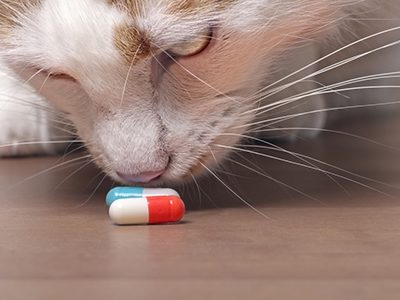March is Poison Prevention Month. This is just as relevant for pets as it is for people. According to the U.S. Humane Society, as many as 10,000 pets are poisoned each year. This is one area where an ounce of prevention is worth a pound of cure! A Chesapeake, VA veterinarian offers advice on protecting your pet below.
Foods
Although different types of pets have their own specific lists of safe and unsafe foods, there are some that are dangerous to all of them. That includes chocolate, alcohol, garlic and onions, avocado, and products that contain xylitol. Ask your vet for specific advice.
Chemicals
The average household contains dozens of products that are toxic to pets. In fact, pets only need to walk through a recently-treated patch of lawn or a spot of cleaner and then lick their paws to ingest dangerous chemicals. This is a particular concern with lawn/garden products and cleaning agents. Keep your pet off areas you are treating.
Antifreeze
Antifreeze is another danger. It’s highly toxic to pets, but often has a flavor that they find appealing. Opt for pet-safe brands, and clean up spills right away.
Pesticides
Pesticides, rodenticide, and herbicides are also very common sources of poisoning in pets. Use non-toxic, humane methods to get rid of any unwanted guests, such as rats or mice. This is also important because it protects wild animals. Many predators, particularly hawks, owls, and other birds of prey, have been poisoned by eating rodents that have ingested pesticide.
Signs
The signs of poison ingestion vary, depending on the pet and the substance. However, there are a few general clues to look for. Drooling, vomiting, trembling, and agitation are common ones. Some pets will go into convulsions or seizures. Keep in mind that these red flags won’t necessarily pop up immediately. In some cases, it can take up to 4 days for symptoms to show.
Poison Control
If you know or suspect that your pet has been poisoned, the first thing you want to do is contact your vet, or a pet poison hotline. The ASPCA one is (888) 426-4435. (Charges may apply.) We do recommend having hydrogen peroxide and activated charcoal in your first-aid kit. However, you should also only act under professional guidance.
Do you have questions about your pet’s health or care? Contact us, your Chesapeake, VA animal clinic, today!









